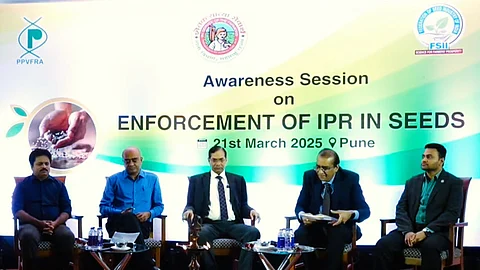

Pune: As India’s seed industry continues to expand its global footprint, experts are urging the government to reinforce its intellectual property rights (IPR) framework to curb rampant counterfeiting and unauthorized seed trade. Industry leaders stress that strong IPR enforcement is essential not only for India’s competitiveness in the global seed market but also for protecting farmers from financial losses caused by substandard products.
At a high-level conference organized in Pune by the Federation of Seed Industry of India (FSII) in collaboration with the Protection of Plant Varieties and Farmers’ Rights Authority (PPVFRA) and the Maharashtra Department of Agriculture, policymakers, seed industry representatives, and agricultural experts discussed urgent reforms required to safeguard seed innovation.
Call for Stricter Enforcement and Awareness Initiatives
Maharashtra’s Chief Quality Control Officer for Agriculture, Praveen Deshmukh, underscored the government’s commitment to protecting intellectual property in the seed sector. He emphasized the need for comprehensive awareness campaigns and training programs to educate farmers and industry players about IPR laws and the risks associated with using unauthorized seeds.
“Many cases of seed piracy arise due to a lack of awareness. It is critical to bridge this knowledge gap through regulatory workshops and state-led initiatives,” Deshmukh stated.
The Role of Policy in Protecting Seed Innovation
Dr. Trilochan Mohapatra, Chairperson of PPVFRA and former Secretary of DARE & DG, ICAR, stressed that all policy decisions must prioritize the interests of farmers. He reiterated that the Protection of Plant Varieties and Farmers’ Rights Act (PPVFRA) is designed to promote agricultural innovation while ensuring farmers benefit from legally protected seed varieties.
“With private companies supplying nearly 70% of the formal seed market, raising awareness about plant variety protection (PVP) and IPR is crucial. Unregulated seed sources pose a direct threat to seed quality and farmer livelihoods,” Dr. Mohapatra said.
